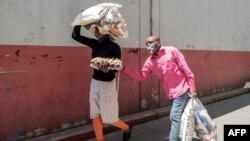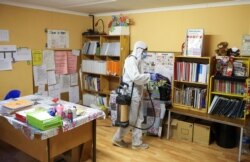A pandemic poses an even greater challenge for the estimated 3 million South Africans who classify as disabled. The coronavirus pandemic has taken the unique toll on a community of blind burn victims.
Mary Louise Ganyile was born with albinism, low vision and poor hearing. She married and bore 11 children.
Then, at the age of 29, she realized she was going totally blind. That sense of helplessness drove her to attempt suicide.
Now, more than two decades later, stress is again bearing down on her. Like many members of South Africa’s 3 million member disabled community, she said the COVID-19 pandemic has dealt her severe hardship. But this time, she’s not defeated. She’s angry.
“Our government doesn’t care about us. That COVID -- I did not hear anyone, from the radio or from the TV, to say the government is holding a workshop or anything to help the people living with disabilities. I didn’t hear anything. So, to me, our government just put us behind,” she said.
President Cyril Ramaphosa has addressed his nation numerous times in the year since the pandemic started. In them, he’s addressed the nation’s fears and announced a raft of social and economic interventions.
But Ganyile said he hasn’t spoken about the unique toll the pandemic has taken on the disabled community.
Members of South Africa’s blind community say the pandemic restrictions -- from lockdowns to social distancing -- have dealt a huge blow to their independence.
The gloves and masks used to protect against COVID-19 blunt their senses of smell and touch, and social distancing limits how other people can physically guide them.
Bronwen Jones started a home and school in 2003 for young burn victims, many of whom are blind. It started with Dorah, her now 26-year-old daughter, who she adopted as a young child. Dorah was badly burned as an infant and lost her eyes, nose and hands.
Dorah is a fixture in her Johannesburg neighborhood and, before the pandemic, was often seen walking the streets or browsing local shops with friends.
Her mother lives in fear of what will happen if she gets the coronavirus.
“The powers that be would probably say she could die because they don't care about very disabled people and they don't want to spend money on them, and they make a judgment about highly disabled people and they think their lives aren't worth living. So that is brutally scary, that they think people's lives are worth nothing," said Dorah.
Running an institution for disabled children has been especially rough during this pandemic, Jones said. Donations have dried up, and keeping the children safe from viral exposure is a constant challenge.
But Jones says when she’s down, she looks to her daughter and the other kids in her home. She says these children have already mastered something their abled counterparts are only now learning how to do: survive.
(If you are having thoughts of suicide, please visit https://www.iasp.info/resources/Crisis_Centres/Africa/ for a list of hotlines in Africa. In South Africa, the hotline number is 0800 12 13 14.)





